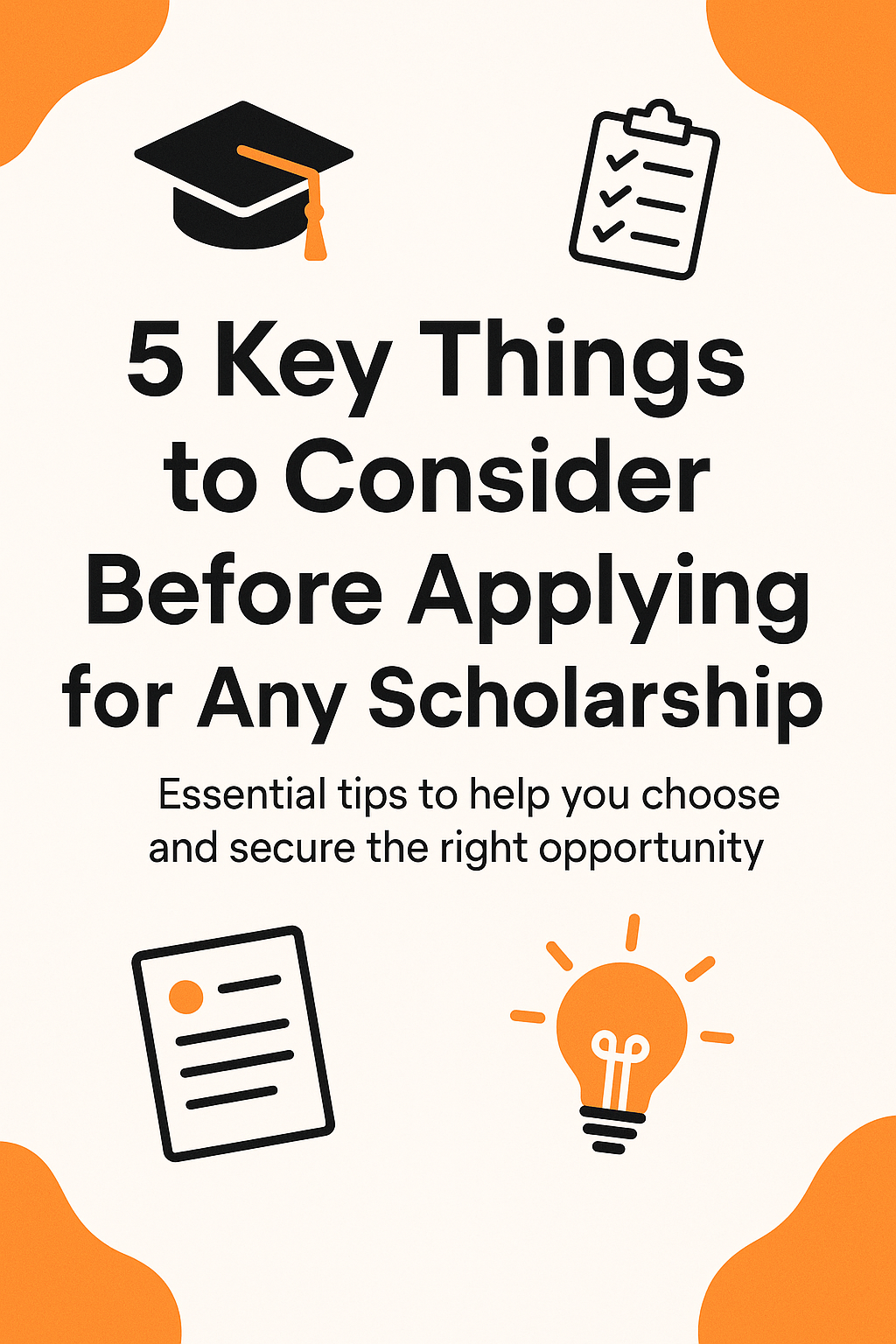
Mastering the Art of the Winning Scholarship Essay

Your Guide to Writing an Essay That Secures Your Dream Scholarship
Scholarships offer life-changing opportunities, but with fierce competition, standing out is crucial. Among hundreds or even thousands of applicants, your essay is your chance to shine, a personal narrative that showcases your strengths, aspirations, and why you deserve the award.
So, how do you craft a scholarship essay that captivates the selection committee and increases your chances of success? This in-depth guide provides expert strategies to help you write with clarity, impact, and persuasion.
Understanding the Essay Prompt in Depth
Every exceptional essay begins with a deep understanding of the question. Scholarship essays often come with prompts designed to evaluate your values, experiences, and ambitions. Examples include:
- Describe a time you overcame a challenge
- Explain your career goals and how this scholarship will help
- How do you contribute to your community
How to Approach It
- Read the prompt attentively, several times, if necessary
- Identify essential keywords such as "describe," "explain," or "reflect" to determine the required response style
- Analyze the underlying intent: Is the question assessing leadership, perseverance, social impact, or innovation
Example: If the question focuses on community involvement, do not divert into academic achievements, illustrate your tangible contributions to society
Understanding the Scholarship Provider’s Priorities
Every scholarship is backed by an institution with specific values and objectives. Aligning your essay with their mission increases your chances of success.
Key Research Points
- What are the organization’s goals
- Do they emphasize leadership, social impact, STEM advancements, or financial need
How to Tailor Your Essay
- If it is a Science, Technology, Engineering and Mathematics (STEM) focused scholarship, highlight your innovative projects or interest in technology
- For humanitarian scholarships, emphasize empathy, community service, or social engagement
Example: If applying for a tech-oriented scholarship, discuss your AI initiatives, app development journey, or how technology addresses societal challenges
Using Storytelling to Make a Lasting Impression
Facts are important, but stories create emotional connections. Instead of simply stating, "I am hardworking," narrate a compelling anecdote that demonstrates your perseverance, passion, or resilience.
Elements of a Powerful Story
- Personal and specific details
- A challenge, action, and outcome framework
- A connection to your long-term aspirations
Example
During my final year of secondary school, I noticed classmates struggling with mathematics. Although I was not a top student, I created tutoring sessions with customized materials and stayed after school for weeks. By the end of the term, seven students improved from failing to passing. That moment solidified my passion for education and helping others succeed—leading me to pursue a career as a teacher
This approach conveys who you are, what you stand for, and why the scholarship is essential for your journey
Highlighting Your Achievements with Meaning
Your accomplishments matter, but simply listing them is ineffective. Instead, connect them to specific skills, values, or lessons that define your growth
Effective Ways to Present Achievements
- Illustrate how each milestone contributed to your leadership, resilience, or expertise
- Utilize measurable outcomes for credibility such as "Raised literacy rates by 20%" or "Led a team of 15 to conduct outreach programs"
Weak Example: I served as the president of my school club Stronger Alternative: As president, I led a team of 15 in mentoring junior students, improving engagement levels by 40 percent and fostering personal development in over 50 participants
Defining Your Vision and Career Goals Clearly
Scholarship committees seek candidates with a strong sense of purpose. Where do you see yourself in five or ten years? How will the scholarship contribute to your journey?
Essential Components of Your Future Vision
- Career goals, both short-term and long-term
- Anticipated contribution to society or your field
- Why this scholarship is pivotal to achieving your aspirations
Example: I aspire to be a public health nutritionist, providing sustainable dietary education for underserved communities. This scholarship will enable me to acquire specialized training and knowledge, ensuring I make a tangible impact on improving health outcomes
Authenticity Over Perfection
You do not need to portray an unrealistic, flawless persona. Genuine stories, real struggles, and sincere ambitions resonate more than forced perfection
How to Stay Authentic
- Avoid generic phrases such as "I have always wanted to help people"
- Speak in a polished yet natural tone
- Be personal and insightful instead of overly academic
Imagine speaking to a mentor who genuinely wants to understand your story—that is the tone to aim for
Structuring for Maximum Impact
A well-organized essay enhances readability and effectiveness. Follow a structured approach
- Introduction: Engage the reader with an intriguing hook and a clear thesis statement
- Body Paragraphs: Use two to three focused sections to narrate your experiences, highlight achievements, and articulate your goals
- Conclusion: Reflect on your journey, express gratitude, and leave a memorable final thought
Pro Tip: Ensure logical flow between sections and maintain concise yet compelling language
Revising and Polishing Like a Professional
Even the best first drafts require refinement. Editing enhances clarity, coherence, and correctness
Strategies for Effective Editing
- Take breaks and revisit with fresh eyes
- Read your essay aloud to assess fluency
- Eliminate redundancy and off-topic content
- Use tools such as Grammarly or Hemingway for precision
Respecting the Word Limit
Exceeding the required word count may reflect poorly on your ability to follow instructions. Aim to stay within the recommended range, such as 480 to 500 words for a 500-word limit
Concluding with Gratitude and Confidence
Wrap up with appreciation and conviction, affirming your commitment to making a meaningful impact
Example: I sincerely appreciate the committee’s time in reviewing my application. This scholarship represents an invaluable opportunity, and I am eager to leverage it for positive change
Final Thoughts
Your scholarship essay is more than an application, it is your personal brand, your story, and your blueprint for success. Approach it with strategy, sincerity, and conviction, and you will craft an essay that resonates with evaluators and elevates your chances of securing your dream scholarship
Now, go write with purpose and confidence. Your future awaits
You may also like
0 Comments
Leave a Reply
Subscribe Today!
Subscribe to our weekly Newsletter and receive updates via email.
Scholarships by Category
- Masters (165)
- Fully Funded (78)
- Undergraduate (212)
- Women (15)
- Health (16)
- Medicine (11)
- Nursing (8)
- PhD (71)
- Training (41)
- Tech (12)
- Bachelors (11)
- MBA (7)
- Entrepreneurs (22)
- Contests (9)
- College School (4)
- STEM (4)
- Partial funding (69)
- Internship (26)
- Grants (20)
- Law (5)
Scholarship Awarding Countries
- Nigeria (41)
- United States (53)
- United Arab Emirates (1)
- Canada (141)
- United Kingdom (127)
- Taiwan (2)
- India (2)
- Senegal (1)
- Switzerland (10)
- Brazil (1)
- Germany (15)
- Australia (24)
- Japan (7)
- Belgium (1)
- Czech Republic (1)
- South Africa (8)
- Ghana (5)
- Austria (2)
- Thailand (2)
- Malaysia (1)
Eligible Regions
Eligible Countries
- Nigeria (97)
- United States (99)
- Canada (130)
- United Kingdom (107)
- Mexico (87)
- Jordan (86)
- Germany (86)
- Ireland (86)
- Ukraine (86)
- Brazil (86)
- Ethiopia (85)
- Ghana (85)
- South Africa (85)
- Tunisia (85)
- Zambia (85)
- India (85)
- Lebanon (85)
- Palestine (85)
- Syria (85)
- Taiwan (85)
Scholarships by School
- Khalifa University (1)
- University of British Columbia (4)
- Queen’s University Belfast (1)
- Royal Agricultural University (RAU) (1)
- Sheffield Hallam University (3)
- University of Sheffield (1)
- University of Sussex (1)
- University of Oxford (4)
- Harvard University (2)
- Yukon University (4)
- Wilfrid Laurier University (1)
- Bournemouth University (1)
- University of Birmingham (4)
- Northumbria University (4)
- Kingswood University (1)
- University of Ottawa (5)
- University of Calgary International (5)
- Concordia University (3)
- Burman University (4)
- Booth University College (3)
Scholarships by Sponsors
- Flour Mills of Nigeria Plc (FMN) (1)
- FCM Foundation Board Scholarship (FBS) (1)
- United States Army (1)
- Khalifa University (1)
- Master Card Foundation (4)
- Queen’s University Belfast (1)
- Royal Agricultural University (RAU) (1)
- Food & Farming Discovery Trust (FFDT) (1)
- Sheffield Hallam University (3)
- University of Sheffield (2)
- University of Sussex (1)
- Federal Government of Nigeria (1)
- University of Oxford (2)
- Harvard University (1)
- Yukon University (4)
- Wilfrid Laurier University (1)
- Bournemouth University (1)
- University of Birmingham (4)
- Robert Gordon University (RGU) (1)
- British Council (2)
Latest Top Scholarship Tips

Top 10 Easiest STEM Courses to Study in the US
Not all STEM programs are equally demanding. While...
.png)
Cheapest Universities in Australia for International Students (2025)
Studying in Australia doesn’t have to break...
.png)
15 Most Affordable UK Universities for International Students (2025)
Studying in the UK offers world-class education, b...

Smart Ways to Study Abroad on a Budget, Even with Just a Partial Scholarship
Studying abroad can be expensive, particularly on...

How Can You Create a Powerful Resume as a Student Without Work Experience?
This guide teaches students how to create an impre...

Top 10 Most Affordable Universities in Canada for International Students
Canada is a popular destination for international...
Advertising
Jurassic World Rebirth Quetzalcoatlus Air Dinosaur Pullover Hoodie
Amazon Essentials Women's Active FormFlex Buttery Soft Light Support Crop Tank with Bra and Contrast Trim
The Plus Catalog: the all-you-can-listen catalog including thousands of audiobooks, podcasts, and originals
Jurassic World Rebirth Velociraptor Covert Mission






